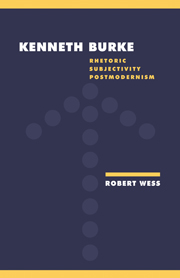Book contents
- Frontmatter
- Contents
- Preface
- Acknowledgments
- List of abbreviations
- 1 Ideology as rhetoric
- 2 Counter-Statement: aesthetic humanism
- 3 Permanence and Change: a biological subject of history
- 4 Attitudes toward History: the agon of history
- 5 The Philosophy of Literary Form: history without origin or telos
- 6 A Grammar of Motives: the rhetorical constitution of the subject
- 7 A Rhetoric of Motives: ideological and utopian rhetoric
- 8 The Rhetoric of Religion: history in eclipse
- Index
5 - The Philosophy of Literary Form: history without origin or telos
Published online by Cambridge University Press: 21 May 2010
- Frontmatter
- Contents
- Preface
- Acknowledgments
- List of abbreviations
- 1 Ideology as rhetoric
- 2 Counter-Statement: aesthetic humanism
- 3 Permanence and Change: a biological subject of history
- 4 Attitudes toward History: the agon of history
- 5 The Philosophy of Literary Form: history without origin or telos
- 6 A Grammar of Motives: the rhetorical constitution of the subject
- 7 A Rhetoric of Motives: ideological and utopian rhetoric
- 8 The Rhetoric of Religion: history in eclipse
- Index
Summary
The critic is trying to synopsize the given work. He is trying to synopsize it, not in the degenerated sense which the word “synopsis” now usually has for us… but in the sense of “conveying comprehensively,” or “getting at the basis of.” And one can work towards this basis… in focussing all one's attention about the motivation, which is identical with structure.
Burke, PLFThe centerpiece of our reading of Burke's career begins with the present chapter and continues through the next two, which examine GM and RM, the two completed parts of the trilogy Burke envisioned in conceiving dramatism. We follow Burke closely but depart from him in extrapolating a rhetoric of the subject, which is present and absent in GM and RM: present as an implication but absent as a term. Sufficient to theorize a rhetoric of the subject, GM and RM are here considered parts of a completed discourse, not parts of an incomplete trilogy. From the standpoint of our reading, as we'll see in later chapters, the projected SM would have been theoretically redundant.
PLF collects previously published essays and reviews from the preceding decade and adds something new in the long title essay, which is both continuous with the work of the 1930s and discontinuous with it in its anticipations of the transformations in Burke's thought that emerge with dramatism. PLF introduces in its subtitle, “Studies in Symbolic Action,” a term that becomes a regular part of Burke's vocabulary thereafter, even appearing over two decades later in another title, Language as Symbolic Action.
- Type
- Chapter
- Information
- Kenneth BurkeRhetoric, Subjectivity, Postmodernism, pp. 108 - 135Publisher: Cambridge University PressPrint publication year: 1996



